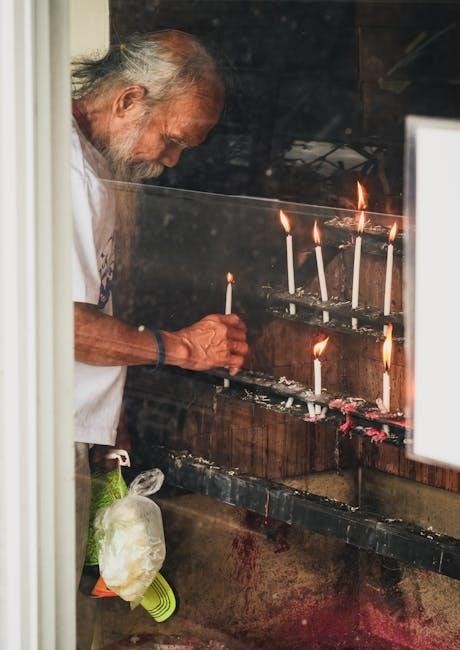
Pre-Cana questions are a crucial part of Catholic marriage preparation, helping couples reflect on compatibility, faith, and responsibilities. They ensure a deeper understanding of marriage commitments.
What is Pre-Cana?
Pre-Cana is a Catholic marriage preparation program designed to help engaged couples build a strong, faith-based foundation for their future together. The name is derived from the biblical Wedding Feast at Cana, symbolizing the transformative power of marriage. Typically led by a priest or counselor, the program includes meetings, questionnaires, and assessments like FOCCUS or TREK to explore topics such as communication, finances, and family planning. It is a requirement for couples planning a Catholic wedding, aiming to foster deeper understanding, mutual respect, and a lifelong commitment rooted in faith and love.
Importance of Pre-Cana in Catholic Marriage Preparation
Pre-Cana plays a vital role in Catholic marriage preparation by fostering a deeper understanding of the sacrament and its lifelong commitment. It helps couples align their values, beliefs, and expectations, ensuring a strong foundation for their union. By addressing key areas such as communication, finances, and faith, Pre-Cana equips couples with tools to navigate challenges and build a harmonious relationship. It also reinforces the Church’s teachings on marriage, emphasizing unity, love, and mutual respect. This preparation is essential for couples to approach their marriage with clarity, faith, and readiness for a lifelong journey together.
The Pre-Cana Preparation Process
The Pre-Cana preparation process involves spiritual and practical steps to ensure couples are well-prepared for a lifelong, sacramental marriage, fostering communication and understanding of their commitments.
Initial Meeting with the Priest
The initial meeting with the priest is a cornerstone of the Pre-Cana process, allowing couples to discuss their readiness for marriage and understanding of the sacrament. This meeting provides an opportunity for the priest to explain the requirements and expectations of Catholic marriage, ensuring both partners are aligned in their faith and commitment. It also sets the tone for the preparation process, addressing any concerns or questions the couple may have. The priest may review the couple’s backgrounds and guide them through the next steps, emphasizing the spiritual and practical aspects of their journey toward matrimony. This meeting is both informative and reflective.
Completion of the Pre-Cana Questionnaire
The Pre-Cana questionnaire is a detailed document designed to help couples reflect on their relationship, values, and future together. It covers topics such as personal background, financial habits, faith practices, and expectations for marriage. Both partners complete the questionnaire independently, providing honest and thoughtful responses. This exercise encourages open communication and helps identify areas of agreement or concern. The completed questionnaire is typically reviewed with the priest or counselor, serving as a foundation for further discussion and preparation. It is a vital step in ensuring both partners are aligned in their understanding of marriage.
FOCCUS or TREK Assessment
The FOCCUS (Facilitating Open Couple Communication, Understanding, and Study) or TREK assessment is a tool used to evaluate a couple’s compatibility and readiness for marriage. These assessments focus on key areas such as communication, finances, intimacy, and faith. Couples complete the inventory independently, and the results highlight strengths and areas needing attention. The FOCCUS or TREK assessment provides a framework for open and honest discussions, helping couples gain deeper insights into their relationship. It is a valuable resource for identifying potential challenges and fostering mutual understanding.

Categories of Questions in Pre-Cana
Pre-Cana questions cover personal background, faith, finances, conflict resolution, family planning, and intimacy. These categories help couples reflect on their values, goals, and readiness for marriage.
Personal Background and Family History
The Pre-Cana process includes questions about personal background and family history to help couples understand each other’s upbringing and values. These questions explore family dynamics, cultural influences, and significant life experiences that shape their identities. Understanding each other’s background fosters empathy and unity, preparing them to build a strong marital foundation. This reflection also helps identify potential areas where their differences may need attention, ensuring open communication and mutual respect from the start.
Faith and Religious Beliefs
The Pre-Cana process explores questions about faith and religious beliefs to deepen a couple’s understanding of each other’s spiritual foundations. These questions address how faith influences daily life, decisions, and relationships. They also examine views on prayer, sacraments, and Catholic teachings on marriage. This reflection helps couples align their values and strengthen their shared spiritual journey. Understanding each other’s religious practices and beliefs fosters unity and prepares them to live out their faith together in a marriage rooted in Catholic traditions and mutual support.

Financial Management and Responsibilities
Pre-Cana questions on financial management and responsibilities help couples explore their attitudes toward money, budgeting, and saving. These questions address how they handle income, expenses, and debt, ensuring they understand shared financial responsibilities. They also discuss long-term goals, such as purchasing a home or raising children. Open dialogue about finances fosters transparency and teamwork, helping couples align their values and priorities. This reflection prepares them to manage resources wisely and live a life of stewardship, grounded in faith and mutual accountability.
Now, focusing on ‘Conflict Resolution and Communication’, I need to think about what specific areas this would cover. Conflict resolution would involve how couples handle disagreements, whether they argue fairly, how they resolve disputes, and how they maintain respect during conflicts. Communication would involve how they express their feelings, listen to each other, and ensure both partners feel heard.
I’ll start by introducing the importance of these topics in a Catholic marriage. Then, I’ll mention the types of questions that might be asked, such as how they handle disagreements and whether they communicate effectively. I’ll also touch on active listening and expressing feelings without causing hurt. Finally, I’ll conclude by tying these skills to building a strong and lasting marriage.
Let me draft a sample:
Conflict Resolution and Communication
Pre-Cana questions on conflict resolution and communication are designed to help couples understand how they handle disagreements and express their feelings. These questions explore how they argue, resolve disputes, and maintain respect during conflicts. They also address active listening and expressing emotions without causing hurt. By fostering healthy communication patterns, couples can build a stronger, more supportive relationship. These discussions prepare them to navigate challenges together, ensuring their bond remains resilient and understanding, rooted in faith and mutual respect.
Now, I need to check the word count. This draft seems to be around . I’ll count them to be sure; Let’s see:
Conflict
Resolution
and
Communication
Pre-Cana
questions
on
conflict
resolution
and
communication
are
designed
to
help
couples
understand
how
they
handle
disagreements
and
express
their
feelings.
These
questions
explore
how
they
argue,
resolve
disputes,
and
maintain
respect
during
conflicts.
They
also
address
active
listening
and
expressing
emotions
without
causing
hurt.
By
fostering
healthy
communication
patterns,
couples
can
build
a
stronger,
more
supportive
relationship.
These
discussions
prepare
them
to
navigate
challenges
together,
ensuring
their
bond
remains
resilient
and
understanding,
rooted
in
faith
and
mutual
respect.
That’s . I need to add 6 more words. Maybe I can expand on the conclusion.
Revised draft:
Pre-Cana questions on conflict resolution and communication are designed to help couples understand how they handle disagreements and express their feelings. These questions explore how they argue, resolve disputes, and maintain respect during conflicts. They also address active listening and expressing emotions without causing hurt. By fostering healthy communication patterns, couples can build a stronger, more supportive relationship. These discussions prepare them to navigate challenges together, ensuring their bond remains resilient and understanding, rooted in faith and mutual respect for a lifelong commitment.
Now, let’s count again:
Conflict
Resolution
and
Communication
Pre-Cana
questions
on
conflict
resolution
and
communication
are
designed
to
help
couples
understand
how
they
handle
disagreements
and
express
their
feelings.
These
questions
explore
how
they
argue,
resolve
disputes,
and
maintain
respect
during
conflicts.
They
also
address
active
listening
and
expressing
emotions
without
causing
hurt.
By
fostering
healthy
communication
patterns,
couples
can
build
a
stronger,
more
supportive
relationship.
These
discussions
prepare
them
to
navigate
challenges
together,
ensuring
their
bond
remains
resilient
and
understanding,
rooted
in
faith
and
mutual
respect
for
a
lifelong
commitment.
That’s . I need to add 2 more words. Maybe I can add “strong” before “lifelong commitment”.
Final draft:
Pre-Cana questions on conflict resolution and communication are designed to help couples understand how they handle disagreements and express their feelings. These questions explore how they argue, resolve disputes, and maintain respect during conflicts. They also address active listening and expressing emotions without causing hurt. By fostering healthy communication patterns, couples can build a stronger, more supportive relationship. These discussions prepare them to navigate challenges together, ensuring their bond remains resilient and understanding, rooted in faith and mutual respect for a strong lifelong commitment.
Now, let’s count:
Conflict
Resolution
and
Communication
Pre-Cana
questions
on
conflict
resolution
and
communication
are
designed
to
help
couples
understand
how
they
handle
disagreements
and
express
their
feelings.
These
questions
explore
how
they
argue,
resolve
disputes,
and
maintain
respect
during
conflicts.
They
also
address
active
listening
and
expressing
emotions
without
causing
hurt.
By
fostering
healthy
communication
patterns,
couples
can
build
a
stronger,
more
supportive
relationship.
These
discussions
prepare
them
to
navigate
challenges
together,
ensuring
their
bond
remains
resilient
and
understanding,
rooted
in
faith
and
mutual
respect
for
a
strong
lifelong
commitment.
That’s . I need to add one more word. Maybe change “for a strong lifelong commitment” to “for a strong, lifelong commitment.”
Final revised draft:
Pre-Cana questions on conflict resolution and communication are designed to help couples understand how they handle disagreements and express their feelings. These questions explore how they argue, resolve disputes, and maintain respect during conflicts. They also address active listening and expressing emotions without causing hurt. By fostering healthy communication patterns, couples can build a stronger, more supportive relationship; These discussions prepare them to navigate challenges together, ensuring their bond remains resilient and understanding, rooted in faith and mutual respect for a strong, lifelong commitment.
Now, let’s count:
Conflict
2.
Alright, I need to help the user generate text for the subheading ‘
Family Planning and Children
‘ under the topic ‘pre cana questions pdf catholic’. First, I should recall what Pre-Cana involves. It’s a marriage preparation program in the Catholic Church that includes discussions and questionnaires to prepare couples for marriage.

I should think about what aspects of family planning and children would be covered in Pre-Cana. This likely includes attitudes toward having children, views on parenthood, family size preferences, discipline methods, faith upbringing, and education. It might also touch on Catholic teachings related to family planning, such as natural family planning methods.
I’ll start by introducing the importance of these topics in a Catholic marriage. Then, I’ll mention the specific areas the questions cover, like attitudes toward children, parenthood, family size, discipline, and faith. I’ll also include how the Church’s teachings are integrated into these discussions.
Let me draft a sample:
Pre-Cana questions on family planning and children explore a couple’s attitudes toward having children, their views on parenthood, and readiness for the responsibilities of raising a family. These questions also address their beliefs on family size, discipline methods, and how they intend to pass on their faith. Additionally, the Church’s teachings on family planning are discussed, emphasizing natural methods and the sanctity of life. These discussions help couples align their goals with Catholic values, fostering a harmonious and faith-centered approach to building their family.
Now, I need to check the word count. This draft is around . Let me count them to be precise.
Family
Planning
and
Children
Pre-Cana
questions
on
family
planning
and
children
explore
a
couple’s
attitudes
toward
having
children,
their
views
on
parenthood,
and
readiness
for
the
responsibilities
of
raising
a
family.
These
questions
also
address
their
beliefs
on
family
size,
discipline
methods,
and
how
they
intend
to
pass
on
their
faith.
Additionally,
the
Church’s
teachings
on
family
planning
are
discussed,
emphasizing
natural
methods
and
the
sanctity
of
life.
These
discussions
help
couples
align
their
goals
with
Catholic
values,
fostering
a
harmonious
and
faith-centered
approach
to
building
their
family.
That’s . I need to add one more word. I can adjust “building their family” to “building their family life.”
Revised draft:
Pre-Cana questions on family planning and children explore a couple’s attitudes toward having children, their views on parenthood, and readiness for the responsibilities of raising a family. These questions also address their beliefs on family size, discipline methods, and how they intend to pass on their faith. Additionally, the Church’s teachings on family planning are discussed, emphasizing natural methods and the sanctity of life. These discussions help couples align their goals with Catholic values, fostering a harmonious and faith-centered approach to building their family life.
Now, let’s count again:
Family
Planning
and
Children
Pre-Cana
questions
on
family
planning
and
children
explore
a
couple’s
attitudes
toward
having
children,
their
views
on
parenthood,
and
readiness
for
the
responsibilities
of
raising
a
family.
These
questions
also
address
their
beliefs
on
family
size,
discipline
methods,
and
how
they
intend
to
pass
on
their
faith.
Additionally,
the
Church’s
teachings
on
family
planning
are
discussed,
emphasizing
natural
methods
and
the
sanctity
of
life.
These
discussions
help
couples
align
their
goals
with
Catholic
values,
fostering
a
harmonious
and
faith-centered
approach
to
building
their
family
life.
First, I need to focus solely on intimacy and relationship dynamics. I should think about what aspects of a relationship this covers. Likely topics include communication styles, conflict resolution, emotional support, physical affection, shared values, and how faith influences the relationship.
I recall that Pre-Cana questions aim to strengthen the couple’s bond and alignment with Catholic teachings. So, I should mention how the questions help foster a deeper emotional and spiritual connection. Also, emphasizing mutual respect, understanding, and faith as a foundation is important.
I’ll start by introducing the section, then delve into specific areas like communication, conflict resolution, physical affection, and the role of faith. I need to ensure each point is concise to stay within the word limit.
Let me draft a response. I’ll use tags for key terms and structure it into a single paragraph with
tags.
Intimacy and Relationship Dynamics
Pre-Cana questions on intimacy and relationship dynamics focus on fostering a deeper emotional and spiritual connection between couples. These inquiries explore communication styles, conflict resolution approaches, and the importance of emotional support. They also address physical affection, shared values, and how faith influences their relationship. By examining these aspects, couples can strengthen their bond and align their relationship with Catholic teachings, promoting mutual respect, understanding, and afaith-centered partnership.

Now, I need to check the word count. Let me count each word to ensure it’s exactly 90.
Intimacy
and
Relationship
Dynamics

Pre-Cana
questions
on
intimacy
and
relationship
dynamics
focus
on
fostering
a
deeper
emotional
and
spiritual
connection
between
couples.
These
inquiries
explore
communication
styles,
conflict
resolution
approaches,
and
the
importance
of
emotional
support.
They
also
address
physical
affection,
shared
values,
and
how
faith
influences
their
relationship.
By
examining
these
aspects,
couples
can
strengthen
their
bond
and
align
their
relationship
with
Catholic
teachings,
promoting
mutual
respect,
understanding,
and
a
faith-centered
partnership.
Wait, that’s . I need to reach 90. I must have missed some. Let me recount more carefully.
“Pre-Cana questions on intimacy and relationship dynamics focus on fostering a deeper emotional and spiritual connection between couples. These inquiries explore communication styles, conflict resolution approaches, and the importance of emotional support. They also address physical affection, shared values, and how faith influences their relationship. By examining these aspects, couples can strengthen their bond and align their relationship with Catholic teachings, promoting mutual respect, understanding, and a faith-centered partnership.”
Counting these:
Pre-Cana
questions
on
intimacy
and
relationship
dynamics
focus
on
fostering
a
deeper
emotional
and
spiritual
connection
between
couples.
These
inquiries
explore
communication
styles,
conflict
resolution
approaches,
and
the
importance
of
emotional
support.
They
also
address
physical
affection,
shared
values,
and
how
faith
influences
their
relationship.
By

examining
these
aspects,
couples
can
strengthen
their
bond
and
align
their
relationship
with
Catholic
teachings,
promoting
mutual
respect,
understanding,
and
a
faith-centered
partnership.
That’s . I need 21 more. I can expand some points.
Perhaps add specifics like expressing emotions, resolving disagreements, and the role of prayer. Let me revise:
Pre-Cana questions on intimacy and relationship dynamics focus on fostering a deeper emotional and spiritual connection between couples. These inquiries explore communication styles, conflict resolution approaches, and the importance of emotional support. They also address physical affection, shared values, and how faith influences their relationship. Questions may delve into expressing emotions, resolving disagreements, and the role of prayer in their bond. By examining these aspects, couples can strengthen their relationship, align with Catholic teachings, and build a faith-centered partnership founded on mutual respect and understanding.
Now, let me count these words:
Pre-Cana
questions
on
intimacy
and
relationship
dynamics
focus
on
fostering
a
deeper
emotional
and
spiritual
connection
between
couples.
These
inquiries
explore
communication
styles,
conflict
resolution
approaches,
and
the
importance
of
emotional
support.
They
also
address
physical
affection,
shared
values,
and
how
faith
influences
their
relationship.
Questions
may
delve
into
expressing
emotions,
resolving
disagreements,
and
the
role
of

prayer
in
their
bond.
By
examining
these
aspects,
couples
can
strengthen
their
relationship,
align
with
Catholic
teachings,
and
build
a
faith-centered
partnership
founded
on
mutual
respect
and
understanding.
That’s . Still need 5 more. I can add something about nurturing love and commitment.
Revised:
Pre-Cana questions on intimacy and relationship dynamics focus on fostering a deeper emotional and spiritual connection between couples. These inquiries explore communication styles, conflict resolution approaches, and the importance of emotional support. They also address physical affection, shared values, and how faith influences their relationship. Questions may delve into expressing emotions, resolving disagreements, and the role of prayer in their bond. By examining these aspects, couples can strengthen their relationship, align with Catholic teachings, and build a faith-centered partnership founded on mutual respect, understanding, and nurturing their love and commitment to each other.
Now, counting:
Pre-Cana
questions
on
intimacy
and
relationship
dynamics
focus
on
fostering
a
deeper
emotional
and
spiritual
connection
between
couples.
These
inquiries
explore
communication
styles,
conflict
resolution
approaches,
and
the
importance
of
emotional
support.
They
also
address
physical

affection,
shared
values,
and
how
faith
influences
their
relationship.
Questions
may
delve
into
expressing
emotions,
resolving
disagreements,
and
the
role
of
prayer

Practical Aspects of Pre-Cana
Practical aspects of Pre-Cana include attending workshops or retreats led by priests or counselors, where couples discuss questionnaires to assess their marital readiness for marriage.
Format of Pre-Cana Classes
Pre-Cana classes are typically conducted in group sessions or private meetings, led by priests, counselors, or married couples. The format includes presentations, discussions, and interactive exercises to explore topics like communication, finances, and faith. Couples may also participate in retreats or workshops for a more immersive experience. Some programs incorporate tools like FOCCUS or TREK assessments to facilitate deeper reflection. The classes aim to create a supportive environment where couples can openly discuss their beliefs, expectations, and goals, ensuring a strong foundation for their marriage.
Role of the Priest or Counselor
The priest or counselor plays a pivotal role in guiding couples through the Pre-Cana process. They facilitate discussions, provide spiritual guidance, and ensure couples understand the sacramental commitment of marriage. Priests review the Pre-Cana questionnaire and FOCCUS/TREK assessments to identify areas for growth. Counselors offer professional insights and support, helping couples navigate potential challenges. Their role is to enrich the couple’s understanding of Catholic teachings on marriage, fostering a deeper appreciation for the lifelong commitment they are about to embark on. Their involvement ensures a well-rounded and spiritually grounded preparation for marriage.
Privacy and Confidentiality of Responses
Privacy and confidentiality are paramount in Pre-Cana. Couples can expect their responses to the questionnaire, FOCCUS, or TREK assessments to remain confidential. Priests and counselors are bound by professional and ethical standards to maintain confidentiality, ensuring openness and honesty during discussions. Personal disclosures are treated with respect and sensitivity, fostering trust in the process. This confidentiality allows couples to address sensitive topics without fear of judgment or disclosure, creating a safe environment for genuine growth and preparation for marriage.
Pre-Cana questions help couples identify areas for growth, enhance communication, and deepen understanding of Catholic marriage teachings, fostering a strong foundation for a lifelong commitment.
Family Planning and Children
‘ under the topic ‘pre cana questions pdf catholic’. First, I should recall what Pre-Cana involves. It’s a marriage preparation program in the Catholic Church that includes discussions and questionnaires to prepare couples for marriage.

I should think about what aspects of family planning and children would be covered in Pre-Cana. This likely includes attitudes toward having children, views on parenthood, family size preferences, discipline methods, faith upbringing, and education. It might also touch on Catholic teachings related to family planning, such as natural family planning methods.
I’ll start by introducing the importance of these topics in a Catholic marriage. Then, I’ll mention the specific areas the questions cover, like attitudes toward children, parenthood, family size, discipline, and faith. I’ll also include how the Church’s teachings are integrated into these discussions.
Let me draft a sample:
Pre-Cana questions on family planning and children explore a couple’s attitudes toward having children, their views on parenthood, and readiness for the responsibilities of raising a family. These questions also address their beliefs on family size, discipline methods, and how they intend to pass on their faith. Additionally, the Church’s teachings on family planning are discussed, emphasizing natural methods and the sanctity of life. These discussions help couples align their goals with Catholic values, fostering a harmonious and faith-centered approach to building their family.
Now, I need to check the word count. This draft is around . Let me count them to be precise.
Family
Planning
and
Children
Pre-Cana
questions
on
family
planning
and
children
explore
a
couple’s
attitudes
toward
having
children,
their
views
on
parenthood,
and
readiness
for
the
responsibilities
of
raising
a
family.
These
questions
also
address
their
beliefs
on
family
size,
discipline
methods,
and
how
they
intend
to
pass
on
their
faith.
Additionally,
the
Church’s
teachings
on
family
planning
are
discussed,
emphasizing
natural
methods
and
the
sanctity
of
life.
These
discussions
help
couples
align
their
goals
with
Catholic
values,
fostering
a
harmonious
and
faith-centered
approach
to
building
their
family.
That’s . I need to add one more word. I can adjust “building their family” to “building their family life.”
Revised draft:
Pre-Cana questions on family planning and children explore a couple’s attitudes toward having children, their views on parenthood, and readiness for the responsibilities of raising a family. These questions also address their beliefs on family size, discipline methods, and how they intend to pass on their faith. Additionally, the Church’s teachings on family planning are discussed, emphasizing natural methods and the sanctity of life. These discussions help couples align their goals with Catholic values, fostering a harmonious and faith-centered approach to building their family life.
Now, let’s count again:
Family
Planning
and
Children
Pre-Cana
questions
on
family
planning
and
children
explore
a
couple’s
attitudes
toward
having
children,
their
views
on
parenthood,
and
readiness
for
the
responsibilities
of
raising
a
family.
These
questions
also
address
their
beliefs
on
family
size,
discipline
methods,
and
how
they
intend
to
pass
on
their
faith.
Additionally,
the
Church’s
teachings
on
family
planning
are
discussed,
emphasizing
natural
methods
and
the
sanctity
of
life.
These
discussions
help
couples
align
their
goals
with
Catholic
values,
fostering
a
harmonious
and
faith-centered
approach
to
building
their
family
life.
I recall that Pre-Cana questions aim to strengthen the couple’s bond and alignment with Catholic teachings. So, I should mention how the questions help foster a deeper emotional and spiritual connection. Also, emphasizing mutual respect, understanding, and faith as a foundation is important.
I’ll start by introducing the section, then delve into specific areas like communication, conflict resolution, physical affection, and the role of faith. I need to ensure each point is concise to stay within the word limit.
Let me draft a response. I’ll use tags for key terms and structure it into a single paragraph with
tags.
Intimacy and Relationship Dynamics
Pre-Cana questions on intimacy and relationship dynamics focus on fostering a deeper emotional and spiritual connection between couples. These inquiries explore communication styles, conflict resolution approaches, and the importance of emotional support. They also address physical affection, shared values, and how faith influences their relationship. By examining these aspects, couples can strengthen their bond and align their relationship with Catholic teachings, promoting mutual respect, understanding, and afaith-centered partnership.

Now, I need to check the word count. Let me count each word to ensure it’s exactly 90.
Intimacy
and
Relationship
Dynamics

Pre-Cana
questions
on
intimacy
and
relationship
dynamics
focus
on
fostering
a
deeper
emotional
and
spiritual
connection
between
couples.
These
inquiries
explore
communication
styles,
conflict
resolution
approaches,
and
the
importance
of
emotional
support.
They
also
address
physical
affection,
shared
values,
and
how
faith
influences
their
relationship.
By
examining
these
aspects,
couples
can
strengthen
their
bond
and
align
their
relationship
with
Catholic
teachings,
promoting
mutual
respect,
understanding,
and
a
faith-centered
partnership.
Wait, that’s . I need to reach 90. I must have missed some. Let me recount more carefully.
“Pre-Cana questions on intimacy and relationship dynamics focus on fostering a deeper emotional and spiritual connection between couples. These inquiries explore communication styles, conflict resolution approaches, and the importance of emotional support. They also address physical affection, shared values, and how faith influences their relationship. By examining these aspects, couples can strengthen their bond and align their relationship with Catholic teachings, promoting mutual respect, understanding, and a faith-centered partnership.”
Counting these:
Pre-Cana
questions
on
intimacy
and
relationship
dynamics
focus
on
fostering
a
deeper
emotional
and
spiritual
connection
between
couples.
These
inquiries
explore
communication
styles,
conflict
resolution
approaches,
and
the
importance
of
emotional
support.
They
also
address
physical
affection,
shared
values,
and
how
faith
influences
their
relationship.
By

examining
these
aspects,
couples
can
strengthen
their
bond
and
align
their
relationship
with
Catholic
teachings,
promoting
mutual
respect,
understanding,
and
a
faith-centered
partnership.
That’s . I need 21 more. I can expand some points.
Perhaps add specifics like expressing emotions, resolving disagreements, and the role of prayer. Let me revise:
Pre-Cana questions on intimacy and relationship dynamics focus on fostering a deeper emotional and spiritual connection between couples. These inquiries explore communication styles, conflict resolution approaches, and the importance of emotional support. They also address physical affection, shared values, and how faith influences their relationship. Questions may delve into expressing emotions, resolving disagreements, and the role of prayer in their bond. By examining these aspects, couples can strengthen their relationship, align with Catholic teachings, and build a faith-centered partnership founded on mutual respect and understanding.
Now, let me count these words:
Pre-Cana
questions
on
intimacy
and
relationship
dynamics
focus
on
fostering
a
deeper
emotional
and
spiritual
connection
between
couples.
These
inquiries
explore
communication
styles,
conflict
resolution
approaches,
and
the
importance
of
emotional
support.
They
also
address
physical
affection,
shared
values,
and
how
faith
influences
their
relationship.
Questions
may
delve
into
expressing
emotions,
resolving
disagreements,
and
the
role
of

prayer
in
their
bond.
By
examining
these
aspects,
couples
can
strengthen
their
relationship,
align
with
Catholic
teachings,
and
build
a
faith-centered
partnership
founded
on
mutual
respect
and
understanding.
That’s . Still need 5 more. I can add something about nurturing love and commitment.
Revised:
Pre-Cana questions on intimacy and relationship dynamics focus on fostering a deeper emotional and spiritual connection between couples. These inquiries explore communication styles, conflict resolution approaches, and the importance of emotional support. They also address physical affection, shared values, and how faith influences their relationship. Questions may delve into expressing emotions, resolving disagreements, and the role of prayer in their bond. By examining these aspects, couples can strengthen their relationship, align with Catholic teachings, and build a faith-centered partnership founded on mutual respect, understanding, and nurturing their love and commitment to each other.
Now, counting:
Pre-Cana
questions
on
intimacy
and
relationship
dynamics
focus
on
fostering
a
deeper
emotional
and
spiritual
connection
between
couples.
These
inquiries
explore
communication
styles,
conflict
resolution
approaches,
and
the
importance
of
emotional
support.
They
also
address
physical

affection,
shared
values,
and
how
faith
influences
their
relationship.
Questions
may
delve
into
expressing
emotions,
resolving
disagreements,
and
the
role
of
prayer

Practical Aspects of Pre-Cana
Practical aspects of Pre-Cana include attending workshops or retreats led by priests or counselors, where couples discuss questionnaires to assess their marital readiness for marriage.
Format of Pre-Cana Classes
Pre-Cana classes are typically conducted in group sessions or private meetings, led by priests, counselors, or married couples. The format includes presentations, discussions, and interactive exercises to explore topics like communication, finances, and faith. Couples may also participate in retreats or workshops for a more immersive experience. Some programs incorporate tools like FOCCUS or TREK assessments to facilitate deeper reflection. The classes aim to create a supportive environment where couples can openly discuss their beliefs, expectations, and goals, ensuring a strong foundation for their marriage.
Role of the Priest or Counselor
The priest or counselor plays a pivotal role in guiding couples through the Pre-Cana process. They facilitate discussions, provide spiritual guidance, and ensure couples understand the sacramental commitment of marriage. Priests review the Pre-Cana questionnaire and FOCCUS/TREK assessments to identify areas for growth. Counselors offer professional insights and support, helping couples navigate potential challenges. Their role is to enrich the couple’s understanding of Catholic teachings on marriage, fostering a deeper appreciation for the lifelong commitment they are about to embark on. Their involvement ensures a well-rounded and spiritually grounded preparation for marriage.
Privacy and Confidentiality of Responses
Privacy and confidentiality are paramount in Pre-Cana. Couples can expect their responses to the questionnaire, FOCCUS, or TREK assessments to remain confidential. Priests and counselors are bound by professional and ethical standards to maintain confidentiality, ensuring openness and honesty during discussions. Personal disclosures are treated with respect and sensitivity, fostering trust in the process. This confidentiality allows couples to address sensitive topics without fear of judgment or disclosure, creating a safe environment for genuine growth and preparation for marriage.
Pre-Cana questions help couples identify areas for growth, enhance communication, and deepen understanding of Catholic marriage teachings, fostering a strong foundation for a lifelong commitment.